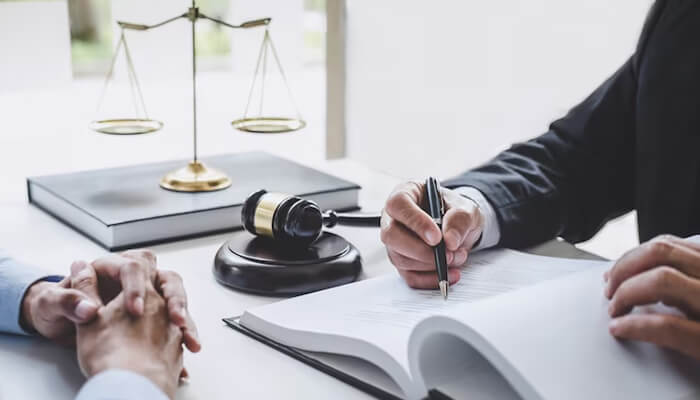Navigating the legal process can be a daunting experience, especially when you’re dealing with a personal injury case. It’s understandable that you may feel overwhelmed and uncertain about the steps you need to take to ensure that you receive full compensation for your physical and emotional damages. That’s why it’s crucial to work with a skilled personal injury lawyer who can guide you through the process and protect your legal rights.
In this blog post, we’ll take a deep dive into the legal process of personal injury cases and provide you with a comprehensive guide on how to handle every step of the way. We’ve collected the insights of some of the best legal experts in the field to inform our advice, so you can trust that this information is reliable and current.
Throughout this guide, we’ll break down the legal process into easy-to-follow steps, including how to gather evidence, communicate with insurance companies, and file a lawsuit, if necessary.
1. Analyzing the specifics of the case
When a personal injury case is brought forward, it is essential to analyze the specifics of the case in order to ensure the best outcome for the client. This includes gathering all relevant evidence, interviewing witnesses, and consulting with medical professionals to understand the extent of the injuries sustained by the client. Additionally, it is necessary to review any documentation related to the incident, such as police reports and medical records. This process of analyzing the specifics of the case allows us as personal injury lawyers to identify potential avenues of liability and build a strong case for compensation for our clients. It is crucial to approach each case individually and thoroughly examine all the details to provide our clients with the best representation possible.
2. Understanding the relevant laws
Understanding the relevant laws is a crucial aspect of navigating the legal process in personal injury cases. As a personal injury lawyer, it is essential to have a comprehensive understanding of the laws that apply to your client’s case, as well as any recent changes or updates to those laws. This knowledge allows you to provide your clients with the guidance they need and ensures that you are fully prepared to argue their case in court. It is also important to stay up-to-date with any changes or updates to laws related to personal injury cases, as they can have a significant impact on the outcome of a case. Additionally, understanding the relevant laws enables you to work effectively with other legal professionals, including judges and opposing counsel, and ensures that you are always advocating for the best interests of your clients.
3. Gathering evidence and developing a strategy
Navigating the legal process in a personal injury case can be daunting. There are a multitude of requirements, forms, and procedures that must be followed precisely in order to achieve a desired outcome. One essential step in this journey is gathering evidence and developing a strategy. This requires a thorough understanding of the facts of the case, including the extent of the plaintiff’s injuries and losses, as well as the circumstances surrounding the accident. The plaintiff’s attorney should conduct a thorough investigation, which may include gathering witness statements, reviewing medical records, and retaining expert witnesses if necessary. Once the evidence is collected, the attorney can develop a comprehensive strategy that aims to achieve a favorable outcome for the plaintiff. This process requires careful attention to detail, a thorough understanding of the law, as well as strong negotiation and advocacy skills. Ultimately, a well-developed strategy can help the plaintiff achieve the compensation they deserve, while ensuring that their legal rights are protected throughout the process.
4. Representing the client in legal proceedings
Representing clients in legal proceedings is a crucial responsibility that personal injury lawyers undertake. During this process, the lawyer’s role is to act as an advocate for their client, providing a strong and persuasive argument on their behalf. This may involve presenting evidence, cross-examining witnesses, and making legal submissions. It is essential that the lawyer has a thorough understanding of the legal rules and regulations that apply to the case, as well as a deep knowledge of precedents and the judicial system. It is also vital that an attorney has excellent communication skills, empathy, and the ability to build trust with their client. Representing a client in legal proceedings requires a delicate balance of skill, knowledge, and professionalism, and a personal injury lawyer must ensure they act with the utmost integrity and competence at all times.
5. Negotiating a resolution that meets the client’s needs
One of the most critical steps in the legal process of a personal injury case is negotiating a resolution that meets the client’s needs. As a personal injury lawyer, it is your responsibility to advocate for your client and ensure that they receive a fair settlement or resolution. To achieve this goal, it is crucial to understand the client’s needs and goals thoroughly. You must establish clear lines of communication with your client and stay up-to-date with any changes in their situation that could affect their desired outcome. When negotiating with the other party, it is essential to remain professional and firm while working towards a mutually beneficial resolution. Ultimately, by navigating negotiation with care, compassion, and expertise, you can help your client move on from their injury with the financial resources they need to rebuild their life.
In conclusion, navigating the legal process after suffering a personal injury can be a complex task. However, with the help of an experienced personal injury lawyer, victims can make informed decisions about their options and pursue the compensation they deserve. From gathering evidence to negotiating with insurance companies, a skilled attorney can guide clients through each step of the legal process and help alleviate the stress associated with a personal injury claim. By seeking the assistance of a qualified attorney, individuals can rest assured that their rights are protected and their best interests are being represented.



